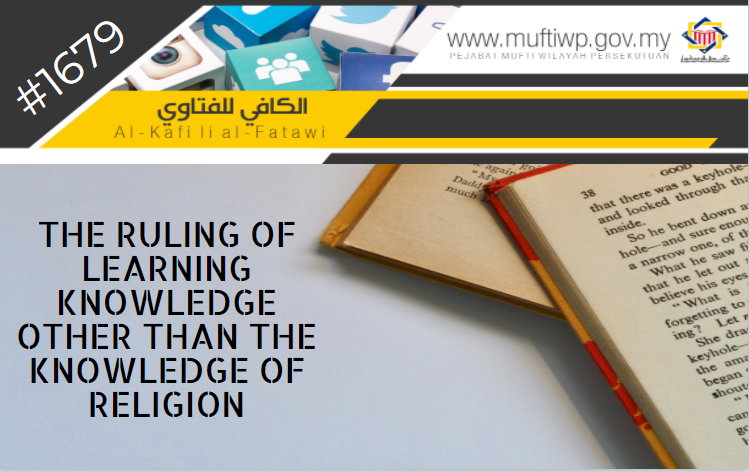Question:
Assalamualaikum wrm.wbt.,
I want to ask a question, what is the ruling for us to learn other knowledges (worldly knowledge) other than the knowledge of religion such as the knowledge in medicine, business and others? Is this permissible in Islam? Hope for an explanation. Thank you.
Answer:
Waalaikumussalam wrm. wbt.,
Alhamdulillah, praise and thanks to Allah for the countless blessings He has blessed us all with. Blessings and salutations to the Prophet Muhammad PBUH, his wives, his family, companions and all those that follow his teachings to the day of judgement.
We will start with the statement of Allah SWT:
فَلَوْلَا نَفَرَ مِن كُلِّ فِرْقَةٍ مِّنْهُمْ طَائِفَةٌ لِّيَتَفَقَّهُوا فِي الدِّينِ وَلِيُنذِرُوا قَوْمَهُمْ إِذَا رَجَعُوا إِلَيْهِمْ لَعَلَّهُمْ يَحْذَرُونَ
“For there should separate from every division of them a group [remaining] to obtain understanding in the religion and warn their people when they return to them that they might be cautious.”
Surah al-Taubah (122)
In this verse, Allah SWT clearly states the commandment for some Muslims to learn religious matter and teach them to the public. Syeikh al-Sa’di when commenting on this verse said, Allah SWT commanded some of its ummah to learn the knowledge of syarak and the prohibitions of Islam, understanding its secrets and wisdoms as well as learning other knowledges and subsequently teach them his people after some of them has returned (from jihad). [See Tafsir al-Sa’di; pg.355]
Learning is a commandment in Islam. There are numerous evidences from the Quran and al-Sunnah as well as the words of scholars and hukama’ regarding the advantages of those who study. We have discussed this matter in our article titled Irsyad al-Hadith Series 109: The Advantages of Studying.
Coming back to the question presented, regarding the ruling of learning worldly knowledge which means knowledge other than the knowledge of syarak, Imam al-Ghazali stated in his book, teaching knowledge is fardhu kifayah, it is known that the types of fardhu is not different from one another except in how the divisions of knowledge is considered. Knowledge is divided into two; syar’iyyah and non-syar’iyyah. The knowledge of syarak is the knowledge form the prophets, while non-syar’iyyah knowledge are further divided into mahmudah (good), mazmumah (bad) and mubah (permissible) knowledge. Mahmudah knowledge are knowledge related to the good in this world such the knowledge in medicine and mathematics. These are included in fardhu kifayah, although they are not an obligation but they are prioritized. While the fardhu kifayah ruling for them is due to the fact that these knowledges are needed for the worldly matters such as the knowledge of medicine is a necessity to maintain the health of our physical body. Another example is the knowledge of mathematics, it is essential in business transactions, division of inheritance (faraid) and others. All these knowledges if none learns it (from a certain state), then it would lead to inconvenience to its people.
(Refer Ihya’ ‘Ulum al-Din; 1/16-17)
Imam al-Nawawi explained this matter in his famous book:
وَأَمَّا مَا لَيْسَ عِلْمًا شَرْعِيًّا وَيُحْتَاجُ إلَيْهِ فِي قِوَامِ أَمْرِ الدُّنْيَا كَالطِّبِّ وَالْحِسَابِ فَفَرْضُ كِفَايَةٍ أَيْضًا
“As for knowledge other than the knowledge of syarak of which is needed in handling the worldly affairs such as the knowledge of medicine and mathematics, they are fardhu kifayah.”
(Refer al-Majmu’ Syarh al-Muhazzab; 1/26)
As we all know, fardhu kifayah is a wajib matter for a person or a group of Muslim society, regardless of who the person that fulfils it. When it is performed, then the obligation is fulfilled and abrogated for all other Muslims. However, if none performed it, then all of them will bear the sin. Thus, here, it can be understood, fardhu encompasses various fields and wide scope which involves comprehensive aspects of life such as economy, politics, law, military and others. (See al-Mausu’ah al-Fiqhiyyah al-Kuwaitiyyah; 32/96)
Not only that, learning knowledges other than the knowledge of religion depends on the intention of the student, in terms of if he learns worldly knowledge such as the knowledge in business with bad intentions such as to destroy or oppress the Muslims, then it is surely impermissible and according to syarak and could even lead to haram according to Sadd al-Zari’ah which is preventing the permissible that could lead to haram. This is in accordance with a renowned Islamic legal maxim:
ما أدى إلى الحرام فهو حرام
“Whatever that leads to haram is haram.”
Conclusion
To conclude, we would like to state that the ruling of learning knowledge other than religious knowledge is fardhu kifayah and if there are others who are already mastering it, then the obligation to learn it for everyone else is abrogated. Thus, if there are people who wishes to learn it, then it is permissible, however, it is on the following conditions or dawabith:
- It must be based on sincere and good intentions.
- It must be through the correct and permissible means and methods as stated by syarak.
- Does not use the knowledge towards transgression and sins.
Lastly, we pray to Allah SWT to give us the correct understanding in His religion and grant us the strength and sincerity in studying as well as blessing our every deed.
Wallahu a’lam.


